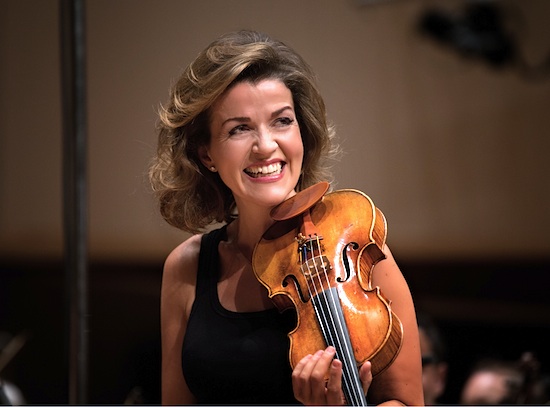Mutter lights a fire with Tchaikovsky in CSO’s season-opener

The day after violinist Anne-Sophie Mutter graced the Symphony Center stage for the gala Symphony Ball in a performance of Mozart’s Violin Concerto No. 5 (“Turkish”), the German superstar was again the center of attention in Saturday night’s official season opener for the Chicago Symphony Orchestra—this time in a scintillating account of Tchaikovsky’s Violin Concerto under the baton of music director Riccardo Muti.
There is little relief during the orchestra’s 127th season from the conservative programming that has marked the Muti era, so it came a welcome surprise to hear the concert open with Krzysztof Penderecki’s The Awakening of Jacob. The composer himself preferred the English translation The Dream of Jacob, but perhaps the former label was deemed by CSO management more appropriate for the occasion.
Penderecki was loathe to draw direct programmatic inferences in any of his instrumental works, but with its appropriation in the soundtrack of Stanley Kubrick’s 1980 film, The Shining, it’s difficult for some audience members to dissociate the mesmerizing score from the chilly cinematic masterpiece.
The composer requires all wind players to double on the ocarina, an ancient vessel flute that gives the vague impression of a hushed, wordless chorus. Muti gave minimal expressive cues to his forces, choosing to let the otherworldly score unfold deliberately and dispassionately. Among the uniformly fine section work throughout, the lower brass were particularly noteworthy, lending an aura of ominous foreboding that no doubt was the bait that lured Kubrick.
Mutter is celebrating 40 years on the concert stage this season, and her glamorous persona and unapologetically individual interpretations have at times earned her more praise from fans than critics.
But her enthusiastic embrace of rigorous contemporary music is evidence that she takes the printed page quite seriously. Her free-wheeling approach suggests that modern virtuosos who don’t personalize their readings of romantic repertoire are themselves being unfaithful to the expectations of 19th century composers like Tchaikovsky.
Conductor and soloist both imbued the opening pages with a casual approach that belied the fireworks and fissures that followed. Mutter’s sound was remarkably chameleonic, shifting colors with each new melodic gesture, change in tempo, or adjustment in orchestral texture. Her refusal to submit to a predictable interpretive routine was as bracing as it was unsettling, providing interest to each bar of music, but sometimes making connections in the sprawling score difficult for the listener to trace.
Nearly each new section in the first movement was marked with a shift in tempo, and often Muti and his forces needed a few beats to catch up. But the occasional unease in ensemble was more than compensated for by her mastery of the concerto’s considerable physical demands. Her staccatos flew from her bow like machine-gun pops, while her legato phrases were luxuriously liquid. The opening of the slow movement was intoned with nary a wobble of vibrato, and with a hushed breathiness that barely crossed the threshold of audibility. The risks and idiosyncrasies usually paid off, with the exception of a few overwrought portamentos that obscured the pitches they were attempting to connect.
The finale zipped along at a breakneck pace, the soloist barely breaking a sweat through the composer’s tortuous stream of virtuosic exhibitionism. Not surprisingly, Mutter drove the tempo ever faster in the coda, etching the solo part with remarkable clarity given her torrid pace. Muti struggled to keep up, but by the final bar soloist and orchestra were in synch, more or less. The violinist treated her rapturous admirers to a vibrant account of the Gigue from Bach’s Partita No. 2 in D minor as encore.
After this incendiary collaboration, the maestro’s reading of Schumann’s Symphony No. 2 seemed tame and lifeless in the early going by comparison. Muti’s insistence on an excessively quiet dynamic led the brass and winds to some tentative playing, and an exaggerated sustain in the principal theme restricted forward momentum until a more satisfying coda. Haydn seemed to be the model for Muti’s effervescent take on the scherzo, a tactic that succeeded only intermittently.
For many, Schumann’s glorious Adagio is the primary reason for the symphony’s continuing inclusion in the canon, and here the maestro didn’t disappoint. Guest oboist Alexander Vvedenskiy, principal of the Louisville Orchestra, soared above the orchestra in splendid fashion, and Muti lovingly molded each sublime phrase in the violins with a brooding, operatic intensity. The finale was nicely paced, well-balanced, and topped off with a vigorous coda.
The program will be repeated 7:30 p.m. Tuesday. cso.org; 312-294-3000.
Posted in Uncategorized




